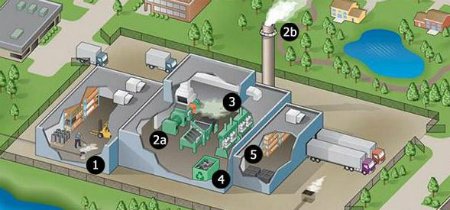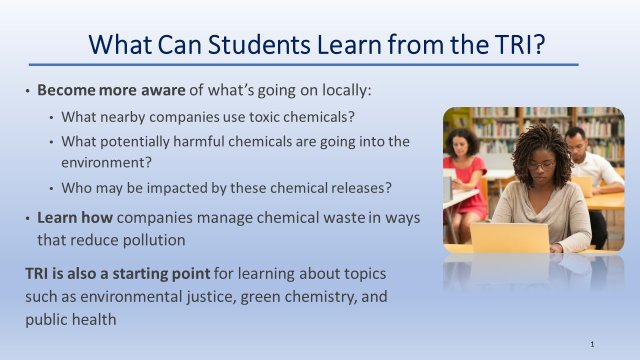TRI in the Classroom
Calling all students! How much do you know about what's happening in your community? Do you know if there's a factory near where you live or go to school? If there is, what chemicals is the factory using? Are chemicals from the factory going into the environment?
Before the Emergency Planning and Community Right-to-Know Act was passed, people had no way to easily get these answers! This law created the Toxics Release Inventory (TRI) and gave everyone the right to know about how companies use chemicals. Now, companies must tell EPA what chemicals they use and what they do with their chemical waste, including how much of each chemical they release into the environment.
The TRI is a starting point for learning about potential impacts to your health and your environment and whether these impacts are greater in your community than in other U.S. communities. See the slides below for details.
Ready-to-Use Materials
These materials are ready for you to use. They are suggested for high-school-age students.
- The Power of Community Right to Know: Short video overview of the right-to-know principle and the TRI Program.
- Intro to the TRI and Industrial Use of Toxic Chemicals (pptx) This presentation gives an overview of the TRI Program, why companies use and dispose of toxic chemicals, and the importance of the information reported to the TRI.
- Investigating Chemical Releases in Your Community (pdf) : This worksheet will walk you through using the TRI Toxics Tracker tool to learn what's going on in your city or ZIP code.
- Look Inside a TRI Facility: Click on different areas in this interactive graphic to see how companies use chemicals to make products, and where chemicals can enter the environment.

Supplemental Materials
These materials explain key TRI concepts and will be useful for students and teachers to browse after looking at the "ready-to-use" materials.
- Factors to Consider When Using TRI Data: Short guide summarizing key limitations of using TRI data.
- Understanding Chemical Waste Management: Get more details about how companies manage chemicals that are no longer useful.
- Understanding Chemical Releases: Get more details about chemical releases into the air, water, and land.
- Understanding Pollution Prevention: Find out how companies work to create less chemical waste and reduce the amount released into the environment.


